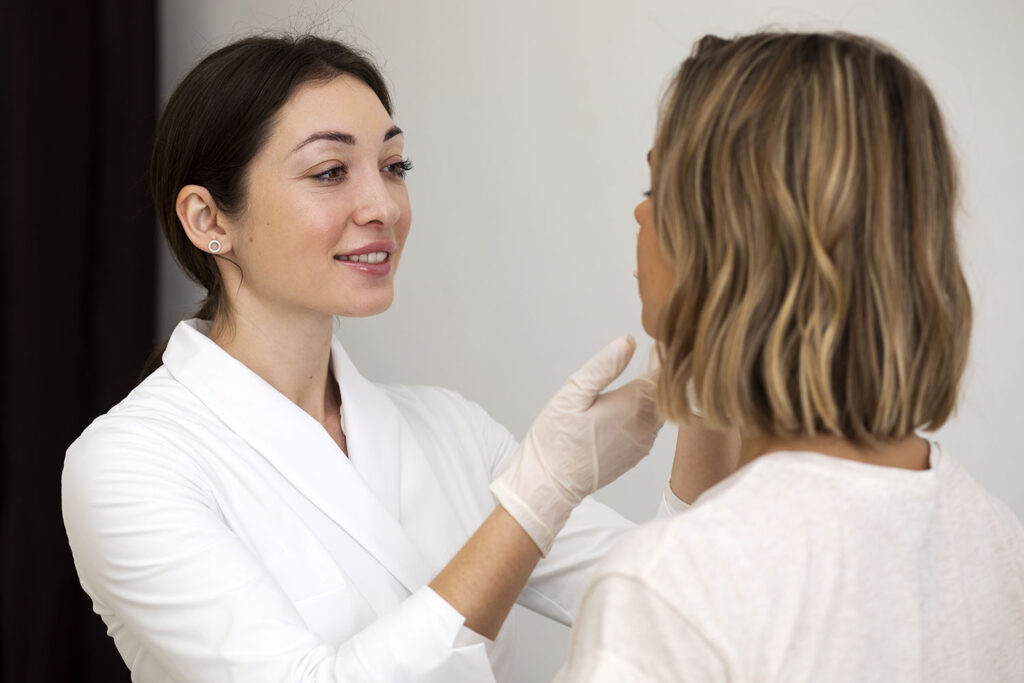Eczema is a chronic skin condition that causes itchy, inflamed patches of skin. Effective treatment is crucial for managing symptoms and improving quality of life.
However, even the best eczema cream may eventually lose its effectiveness.
Understanding why this happens and what steps to take is essential for maintaining control over the condition.
Steps to Take When Your Eczema Cream Stops Working
First, let us see what you should do immediately after this happens.
Consult with Your Dermatologist
Regular check-ins with your dermatologist are vital when managing eczema, especially if your current treatment is losing effectiveness. Your healthcare provider can assess your symptoms, review your treatment plan, and suggest necessary adjustments.
This might involve tweaking dosages or trying new medications.
Open communication about your symptoms and any changes you’ve noticed ensures that your treatment remains effective. If you’re unsure whether your cream is working, a professional evaluation can provide clarity and direction.

Reevaluate and Adjust Treatment
When an eczema cream stops working, it may be time to reevaluate and adjust your treatment plan. This could involve increasing the dosage of your current medication or switching to a stronger topical treatment.
In some cases, your dermatologist might recommend additional treatments such as systemic medications, biologics, or JAK inhibitors. These advanced treatments can be highly effective for managing severe or persistent eczema.
Discussing these options with your healthcare provider will help you find the most appropriate and effective treatment for your condition.
Identify and Manage Triggers
Identifying and managing triggers is a crucial aspect of eczema management. Common triggers include allergens, stress, certain foods, and environmental factors like weather changes. Keeping a detailed diary of your symptoms and potential triggers can help pinpoint what exacerbates your eczema.
Once identified, strategies such as avoiding specific allergens, managing stress through relaxation techniques, and adjusting your skincare routine to accommodate environmental changes can significantly reduce flare-ups. Working with your dermatologist to identify and address these triggers will enhance your overall treatment plan.
Additional Therapies
In addition to adjusting your primary treatment, incorporating additional therapies can help manage flare-ups. This might include using topical steroids or other temporary treatments during severe outbreaks.
Exploring new creams or moisturizers specifically designed for eczema can also provide relief. For instance, some products are formulated to repair the skin barrier and reduce inflammation, offering additional support to your regular treatment.
Experimenting with different products, under the guidance of your dermatologist, can help you find the best eczema cream and additional therapies that work for your skin.
Maintain Proper Skin Care

Proper skin care is fundamental in managing eczema. Moisturizing within three minutes of bathing helps lock in moisture and protect the skin barrier.
Choosing appropriate moisturizers and lotions that are fragrance-free and suitable for eczema-prone skin is essential. Regular, gentle skin care routines can prevent dryness and irritation, reducing the likelihood of flare-ups.
Consistency in your skincare regimen, even when symptoms improve, is crucial for long-term management. If you’re unsure which products to use, consult your dermatologist for recommendations tailored to your skin’s needs.
Consider Mental Health Support
Eczema can take a toll on mental health, making it important to seek support when needed. Stress and emotional distress can exacerbate eczema symptoms, so managing these aspects is crucial.
Consulting with mental health professionals can provide strategies to cope with stress and anxiety related to your condition.
Additionally, joining support networks or online communities where you can share experiences and advice with others who understand your challenges can be immensely beneficial. These resources can offer emotional support and practical tips for managing eczema.
Participate in Clinical Trials
Exploring clinical trial options for new and emerging eczema treatments can provide access to cutting-edge therapies.
Clinical trials offer the opportunity to try new medications or treatments that are not yet widely available. If you’re struggling with persistent symptoms despite conventional treatments, participating in a clinical trial might be an option.
Resources for finding and participating in clinical trials include online registries and consultations with your healthcare provider.
Discussing these options with your dermatologist can help determine if a clinical trial is suitable for you.
Recognizing When Your Eczema Cream Isn’t Working

First, let us take a look at clear signs eczema cream is not functioning well.
Increased or Worsening Symptoms
One of the first signs that your eczema cream may no longer be effective is an increase or worsening of symptoms. This can manifest as heightened itching, more pronounced dryness, or the appearance of new flare-ups.
Monitoring these changes is essential, as they can indicate that the current treatment regimen needs adjustment.
If you notice persistent itching despite regular application of your cream, or if new eczema patches develop, it’s a clear signal that your treatment may need to be reevaluated.
Regularly assessing your skin and keeping a symptom diary can help track these changes and provide valuable information for your healthcare provider.
Symptoms in New Areas
Eczema spreading to new areas of your body can also be a sign that your current treatment is no longer effective. This spread can be triggered by various factors, including environmental changes, allergens, or stress.
Identifying and managing these triggers is crucial in preventing further spread. For instance, if you notice eczema appearing on parts of your body that were previously unaffected, consider any recent changes in your environment or lifestyle.
New detergents, skin care products, or even dietary changes can contribute to flare-ups. By pinpointing these triggers, you can take steps to minimize exposure and help your skin heal.
Impact on Mental Health and Quality of Life

The impact of eczema extends beyond physical discomfort, significantly affecting mental health and quality of life. Persistent symptoms can lead to stress, anxiety, and even depression.
This emotional toll can exacerbate eczema, creating a vicious cycle. The constant itching and visible skin changes can also affect self-esteem and social interactions. Recognizing this connection is important for comprehensive eczema management.
Addressing mental health through stress management techniques, counseling, or support groups can provide relief and improve overall well-being. Additionally, discussing these issues with your dermatologist can lead to a more holistic treatment approach.
The Bottom Line
Monitoring symptoms and maintaining open communication with healthcare providers is essential in managing eczema. Proactive management and exploring new treatment options can provide relief when conventional treatments stop working.
By taking these steps, you can continue to effectively manage your eczema and improve your quality of life.




